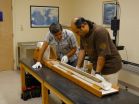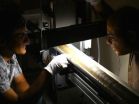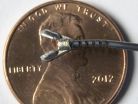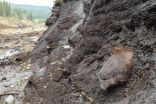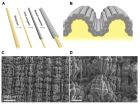Study finds abrupt climate change may have rocked the cradle of civilization
UM Rosenstiel researchers uncover the effects of climate on human societies
2015-07-23
(Press-News.org) MIAMI - New research reveals that some of the earliest civilizations in the Middle East and the Fertile Crescent may have been affected by abrupt climate change. These findings show that while socio-economic factors were traditionally considered to shape ancient human societies in this region, the influence of abrupt climate change should not be underestimated.
A team of international scientists led by researchers from the University of Miami (UM) Rosenstiel School of Marine and Atmospheric Science found that during the first half of the last interglacial period known as the Holocene epoch, which began about 12,000 years ago and continues today, the Middle East most likely experienced wetter conditions in comparison with the last 6,000 years, when the conditions were drier and dustier.
"Evidence for wet early Holocene was previously found in the Eastern Mediterranean Sea region, North and East African lakes and cave deposits from Southwest Asia, and attributed to higher solar insolation during this period," said Ali Pourmand, assistant professor of marine geosciences at the UM Rosenstiel School, who supervised the project. "Our study, however, is the first of its kind from the interior of West Asia and unique in its resolution and multi-proxy approach."
The Fertile Crescent, a region in west Asia that extends from Iran and the Arabian Peninsula to the eastern Mediterranean Sea and northern Egypt is one of the most climatically dynamic regions in the world and is widely considered the birthplace of early human civilizations.
"The high-resolution nature of this record afforded us the rare opportunity to examine the influence of abrupt climate change on early human societies. We see that transitions in several major civilizations across this region, as evidenced by the available historical and archeological records, coincided with episodes of high atmospheric dust; higher fluxes of dust are attributed to drier conditions across the region over the last 5,000 years," said Arash Sharifi, Ph.D. candidate at the department of marine geosciences and the lead author of the study.
The researchers investigated climate variability and changes in paleoenvironmental conditions during the last 13,000 years based on a high-resolution (sub-decadal to centennial) peat record from Neor Lake in Northwest Iran. Abrupt climate changes occur in the span of years to decades.
INFORMATION:
This study, which was funded by the National Science Foundation to A. Pourmand (EAR-1003639) and L. Canuel (EAR-1003529), is titled "Abrupt climate variability since the last deglaciation based on a high-resolution, multi-proxy peat record from NW Iran: The hand that rocked the Cradle of Civilization?" The paper, which will be published in the September 1 issue of the journal of Quaternary Science Reviews, is currently available online.
The study's authors include: Arash Sharifi, Ali Pourmand, Larry C. Peterson, Peter K. Swart of the UM-RSMAS; Elizabeth A. Canuel, Erin Ferer-Tyler of the Virginia Institute of Marine Science, College of William and Mary; Bernhard Aichner, Sarah J. Feakins of the University of Southern California; Touraj Daryaee of the University of California, Irvine; Morteza Djamali of the institut méditerranéen de biodiversité et d'ecologie, France; Abdolmajid Naderi Beni, and Hamid A.K. Lahijani of the Iranian National Institute of Oceanography and Atmospheric Science, Iran.
ELSE PRESS RELEASES FROM THIS DATE:
2015-07-23
A biomarker found in the blood of alcohol users is significantly higher in binge drinkers than in those who consume alcohol moderately, according to a study by researchers at the University of Illinois at Chicago. The biomarker, called phosphatidylethanol (PEth), could be used to screen young adults for harmful or heavy drinking such as binge drinking.
Having performed extensive research on alcohol and its effects on health throughout her career, Mariann Piano, professor and head of the department of biobehavioral health science in the UIC College of Nursing, knew PEth ...
2015-07-23
With the flick of a tiny mechanical wrist, a team of engineers and doctors at Vanderbilt University's Medical Engineering and Discovery Laboratory hope to give needlescopic surgery a whole new degree of dexterity.
Needlescopic surgery, which uses surgical instruments shrunk to the diameter of a sewing needle, is the ultimate form of minimally invasive surgery. The needle-sized incisions it requires are so small that they can be sealed with surgical tape and usually heal without leaving a scar.
Although it's been around since the 1990s, the technique, which is also called ...
2015-07-23
NEW YORK, NY (July 23, 2015)--Researchers at Columbia University Medical Center (CUMC) have developed a computer algorithm that is helping scientists see how drugs produce pharmacological effects inside the body. The study, published in the journal Cell, could help researchers create drugs that are more efficient and less prone to side effects, suggest ways to regulate a drug's activity, and identify novel therapeutic uses for new and existing compounds.
"For the first time we can perform a genome-wide search to identify the entire set of proteins that play a role in ...
2015-07-23
SPOKANE, Wash. - Pharmaceutical sciences researchers at Washington State University have discovered a protein's previously unknown role in cell division.
The well known protein ATF5, or Activating Transcription Factor 5, controls how often specific genes are expressed, or copied from DNA. ATF5 regulates genes that control cell survival.
But the research team has identified a part this protein is playing that is not related to its transcription factor role. Within the part of the cell called the centrosome, ATF5 is also acting as a structural protein.
Structural ...
2015-07-23
Knee pain in older adults, often caused by osteoarthritis, usually means more visits to the doctor and also can be a harbinger of disability.
A study led by Daniel White, assistant professor of physical therapy at the University of Delaware, found that an intensive regimen of regular exercise and a healthy diet might reduce the short-term onset of knee pain for overweight adults with Type 2 diabetes mellitus.
Published in Arthritis Care and Research, White's article "Can an Intensive Diet and Exercise Program Prevent Knee Pain Among Overweight Adults at High Risk'' ...
2015-07-23
New research has revealed abrupt warming, that closely resembles the rapid man-made warming occurring today, has repeatedly played a key role in mass extinction events of large animals, the megafauna, in Earth's past.
Using advances in analysing ancient DNA, radiocarbon dating and other geologic records an international team led by researchers from the University of Adelaide and the University of New South Wales (Australia) have revealed that short, rapid warming events, known as interstadials, recorded during the last ice age or Pleistocene (60,000-12,000 years ago) ...
2015-07-23
A multi-institutional team of researchers has identified an apparently successful treatment for a genetic immune disorder that causes a multitude of health problems - ranging from infections, diabetes, lung disease and the body's immune system attacking and damaging healthy tissues.
Led by Cincinnati Children's Hospital Medical Center and the National Institute of Allergy and Infectious Diseases (NIAID), the researchers report in the July 24 edition of Science a promising therapy for a disorder called LRBA deficiency. They tested the drug abatacept - already FDA-approved ...
2015-07-23
This news release is available in Japanese.
The discovery of a four-legged fossil of a snake hints that this suborder may have evolved from burrowing, rather than marine, ancestors. The unique four-legged specimen, found in Brazil's Crato Formation, provides us with more insight into how these creatures transitioned into the sleek, slithering reptiles that we are familiar with - and often fearful of - today. By analyzing both the genetics and the morphological features of this species compared to other known snake species, and giving different weight to ...
2015-07-23
This news release is available in Japanese.
In the race to produce highly stretchable conductors, researchers have developed a new technique that aligns sheets of layered carbon nanotubes along stretched rubber cores, creating an extremely flexible conductive fiber. From pacemaker leads to flexible displays and batteries, there is a growing need for fibers that don't lose their conductivity upon repeated stretching, twisting or flexing. The challenge has been to create a conductive material that is highly elastic, but that maintains a high level of ...
2015-07-23
Scientists have identified a critical function of what they believe to be schizophrenia's "Rosetta Stone" gene that could hold the key to decoding the function of all genes involved in the disease.
The breakthrough has revealed a vulnerable period in the early stages of the brain's development that researchers hope can be targeted for future efforts in reversing schizophrenia.
In a paper published today in the journal Science, neuroscientists from Cardiff University describe having uncovered the previously unknown influence of a gene in ensuring healthy brain development.
The ...
LAST 30 PRESS RELEASES:
[Press-News.org] Study finds abrupt climate change may have rocked the cradle of civilization
UM Rosenstiel researchers uncover the effects of climate on human societies
